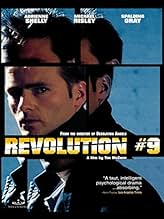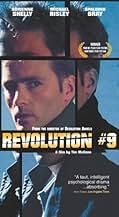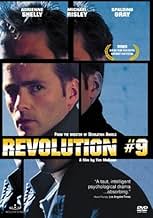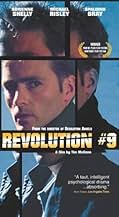A handsome and successful young man's life begins to unravel when he develops an acute sense of paranoia. Things escalate when Jackson is convinced that a tv ad holds sinister messages aimed... Read allA handsome and successful young man's life begins to unravel when he develops an acute sense of paranoia. Things escalate when Jackson is convinced that a tv ad holds sinister messages aimed at him. Is Jackson losing his mind, or are the threats real?A handsome and successful young man's life begins to unravel when he develops an acute sense of paranoia. Things escalate when Jackson is convinced that a tv ad holds sinister messages aimed at him. Is Jackson losing his mind, or are the threats real?
- Awards
- 2 wins & 1 nomination
James Burton
- Therapist Fuller
- (as Jim Burton)
Phyllis Somerville
- Judge Hathaway
- (as Phyllis Sommerville)
- Director
- Writer
- All cast & crew
- Production, box office & more at IMDbPro
Storyline
Did you know
- Crazy creditsNo maggots were harmed during the making of this film.
- ConnectionsReferences L'Eclisse (1962)
Featured review
A taut, edgy psychological drama, brilliantly acted by newcomer Michael Risley and veteran Adrienne Shelly. I know of no other film that so honestly and nakedly depicts mental illness, that takes the viewer inside the excruciatingly painful experience of gradually losing one's grip on reality and forfeiting control of one's life. At the same time, the protagonist's notion that he is the target of a media conspiracy is depicted as merely an exaggerated and distorted version of the overwhelming media saturation and manipulation we all, each and every one of us, experience from day to day. "Take but degree away, untune that string, and hark what discord follows, " said Shakespeare's Ulysses in his play Troilus and Cressida. In this film we sense just how tenuous that string by which we hold onto our sanity, and to everything that matters to us in life, can be.
While the film takes us subjectively, with unnerving close-ups, odd angles, abrupt shifts of focus, into the disorienting experience of its protagonist, it at the same time creates an eerie sense of not only a character increasingly alienated from his world, but of a world of people, objects, even a cityscape themselves sensed as increasingly alien. In holding focus on an object or an image for just a second too long (that is, longer than would be needed to establish that it is the character's bizarre fixation), the unnerving gaze and the sense of the familiar turned suddenly unfamilar feels as if it is our own. In other words, the ordinary world starts to look like something we have never seen or noticed before.
All of this is accomplished by the director with the strength of honest story telling that is the tradmark of his work (Desolation Angels). As stylized and artistically accomplished as the film is, one never senses that it is trying to be self-consciously arty or manipulative for its own sake. It is the story told from the point of view of a man increasingly out of joint in a world itself falling out of joint. So truth, from this perspective, requires that the camera itself be "on tilt."
About the performances one can only admire the intensity and focus brought by Michael Risley to his portrayal of a man going out of focus. We are with him every step of the way, and---and this is I think the trick---our sympathy for him only increases the more off-putting and bizarre his behavior gets. Someone once said you have to be a pretty good skater to play a drunk on skates. Risely navigates this thin ice brilliantly. Adrienne Shelly is also utterly captivating in a very difficult part: the girlfriend who, though utterly powerless to help him, nevertheless tries---not only because she perhaps loves him, but because it is clear that no one else in the world cares or is even concerned. Without ever seeming to give up hope, she senses the situation's desperation, and what is finally at stake. And so, while played as someone vulnerable, even wounded, and tender, she nonetheless brings something of real human strength, even quiet heroism, to the part through her decency and forbearance.
Finally, the film is also, on another level, an indictment of the mental health system and about the cloud that still surrounds mental illness in this country. Legally, there is no way to hold Jackson (Risley's character). And he is too ill to commit himself. And even then, who would pay? Not the insurance companies to be sure. And families for the most part are either financially, emotionally, or socially ill-equipped to cope with the mentally ill. While the film takes the viewer, together with its lead actor, deeper and deeper into the vortex of madness, it nevertheless offers a sobering view of a troubling and grotesque social reality and of affliction that, on more than one level, hits close, too close, to home.
While the film takes us subjectively, with unnerving close-ups, odd angles, abrupt shifts of focus, into the disorienting experience of its protagonist, it at the same time creates an eerie sense of not only a character increasingly alienated from his world, but of a world of people, objects, even a cityscape themselves sensed as increasingly alien. In holding focus on an object or an image for just a second too long (that is, longer than would be needed to establish that it is the character's bizarre fixation), the unnerving gaze and the sense of the familiar turned suddenly unfamilar feels as if it is our own. In other words, the ordinary world starts to look like something we have never seen or noticed before.
All of this is accomplished by the director with the strength of honest story telling that is the tradmark of his work (Desolation Angels). As stylized and artistically accomplished as the film is, one never senses that it is trying to be self-consciously arty or manipulative for its own sake. It is the story told from the point of view of a man increasingly out of joint in a world itself falling out of joint. So truth, from this perspective, requires that the camera itself be "on tilt."
About the performances one can only admire the intensity and focus brought by Michael Risley to his portrayal of a man going out of focus. We are with him every step of the way, and---and this is I think the trick---our sympathy for him only increases the more off-putting and bizarre his behavior gets. Someone once said you have to be a pretty good skater to play a drunk on skates. Risely navigates this thin ice brilliantly. Adrienne Shelly is also utterly captivating in a very difficult part: the girlfriend who, though utterly powerless to help him, nevertheless tries---not only because she perhaps loves him, but because it is clear that no one else in the world cares or is even concerned. Without ever seeming to give up hope, she senses the situation's desperation, and what is finally at stake. And so, while played as someone vulnerable, even wounded, and tender, she nonetheless brings something of real human strength, even quiet heroism, to the part through her decency and forbearance.
Finally, the film is also, on another level, an indictment of the mental health system and about the cloud that still surrounds mental illness in this country. Legally, there is no way to hold Jackson (Risley's character). And he is too ill to commit himself. And even then, who would pay? Not the insurance companies to be sure. And families for the most part are either financially, emotionally, or socially ill-equipped to cope with the mentally ill. While the film takes the viewer, together with its lead actor, deeper and deeper into the vortex of madness, it nevertheless offers a sobering view of a troubling and grotesque social reality and of affliction that, on more than one level, hits close, too close, to home.
Details
Box office
- Budget
- $300,000 (estimated)
- Gross US & Canada
- $10,133
- Opening weekend US & Canada
- $4,936
- Nov 17, 2002
- Gross worldwide
- $10,133
Contribute to this page
Suggest an edit or add missing content




















